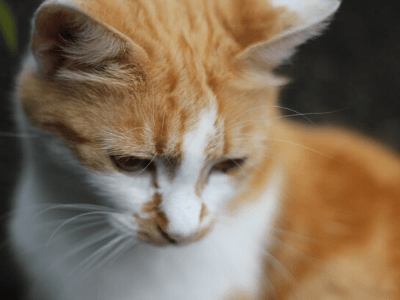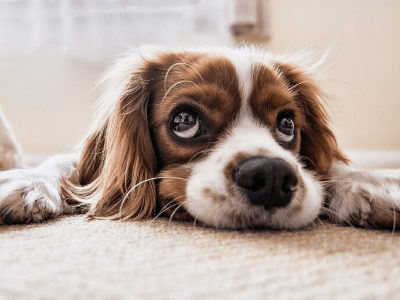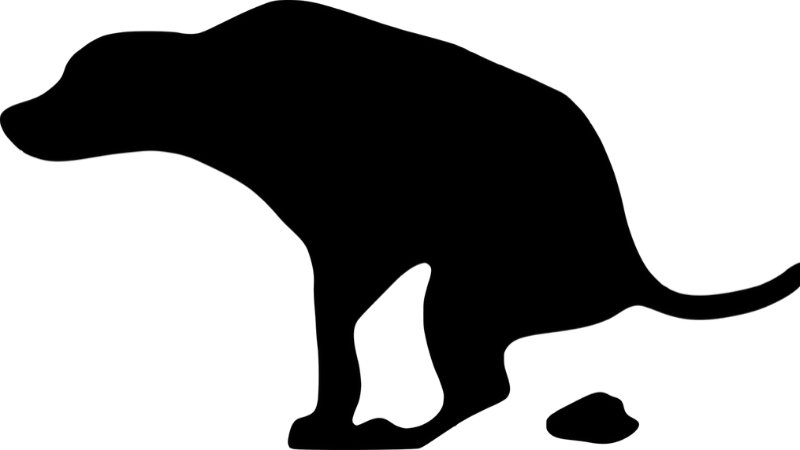Every pet owner has to deal with loose pet stools at one time or another — some of us more than others. Whether you’re a first-time pet parent or you’ve been dealing with your fur baby’s bowel problems for years, you might have questions about the best approach to dealing with pet diarrhea. Let us walk you through a diagnosis of diarrhea and what you should do if your pet has loose stools.
*Allow 5-7 minutes to read.
Diagnosing Diarrhea
First of all, how do you know for sure if your pet’s stool is loose? Sometimes it’s obvious, and sometimes it’s hard to tell. A good rule of thumb is to ask yourself if you can pick the stool up and hold it in your hand (gross, but effective). Look to see if the stool is well-formed, firm, and slightly moist. Side-note: stools that are very hard and/or dry may indicate constipation.
Also take note of the color of the poo. Healthy dog stool should be light brown, tan, or dark brown. Healthy cat stool is usually deep brown. If the stools are black, red, yellow, green, or any other unusual colors, call your veterinarian.
For the cat-owners out there: diarrhea in cats often goes unrecognized at first because cats usually bury their stools in the litter box and are finicky about self-grooming. Keep an eye on your cat’s stools whenever you empty the litter box. Feline diarrhea can resemble urine clumps in the box. If you have a hard time monitoring stools, pay attention to your cat’s rear end; long-haired breeds especially will have staining/soiling around their anal area if they are experiencing diarrhea.
Also take note of the color of the poo. Healthy dog stool should be light brown, tan, or dark brown. Healthy cat stool is usually deep brown. If the stools are black, red, yellow, green, or any other unusual colors, call your veterinarian.
For the cat-owners out there: diarrhea in cats often goes unrecognized at first because cats usually bury their stools in the litter box and are finicky about self-grooming. Keep an eye on your cat’s stools whenever you empty the litter box. Feline diarrhea can resemble urine clumps in the box. If you have a hard time monitoring stools, pay attention to your cat’s rear end; long-haired breeds especially will have staining/soiling around their anal area if they are experiencing diarrhea.
Common Causes of Diarrhea
Once you’ve determined that the stool is indeed loose, start considering the possible contributing factors. There are so many reasons why a pet might have loose stools, and sometimes it can be extremely challenging to figure out the underlying cause. Here are a few common culprits:
What has changed in your dog or cat’s environment or routine recently? Did you bring home a new family member? Did you go on vacation and leave them with a pet-sitter or at a boarding facility? Did you move? Any alteration in a pet’s home environment can cause enough stress to disrupt their gastrointestinal processes and cause irregular bowel movements. Remember, what may not seem like a big deal to you could cause major anxiety for your pet. Diarrhea caused by stress is almost always an acute condition (resulting from a specific trigger and able to resolve within a few days).
Did you recently switch your pet’s food? If so, did you slowly transition your pet to their new food over the course of 5-7 days? Or did you make the food switch outright? Abruptly changing a pet’s diet can upset their gastrointestinal system and cause loose stool. If you recently changed a pet’s diet but also made sure to slowly transition from the old food to the new food, it’s possible that your pet is reacting to one or more ingredients in the new food. Ask your vet if you should try a different diet.
If you recently opened a new bag of your pet’s normal food, it’s possible that the bag was contaminated or the kibble is spoiled. Try a new bag and see if the problem resolves.
Did you buy new treats recently? It’s possible that this small change to your pet’s daily intake was enough to give them the runs. Whenever you purchase a different type of treat, start out by giving small portions to make sure your pet’s tummy can handle it.
If you recently opened a new bag of your pet’s normal food, it’s possible that the bag was contaminated or the kibble is spoiled. Try a new bag and see if the problem resolves.
Did you buy new treats recently? It’s possible that this small change to your pet’s daily intake was enough to give them the runs. Whenever you purchase a different type of treat, start out by giving small portions to make sure your pet’s tummy can handle it.
Did your pet recently get into the trash or grab some food off the counter? Did you or someone else feed your pet some human food that they aren’t used to eating? Human food can cause lots of problems with pets, including diarrhea. Outdoor dogs and cats are also at risk of getting into garbage, litter, dead animals and other nasty things in the back yard or while out exploring.
Some prescription medications, especially antibiotics, can cause GI upset, as can some heart worm/flea/tick preventatives. If your pet recently started a new medication, preventative, or supplement, talk to your vet about the potential for this causing loose stools. Your vet probably can recommend an alternative medication.
If your pet has parasites or a bacterial infection, diarrhea may be a chronic (ongoing) problem. Dogs and cats are usually exposed to parasites and bacteria by eating contaminated animal feces or by coming into contact with an infected animal. The good news is that most parasitical/bacterial infections are easy to diagnose and treat. Your veterinarian will diagnose an infection by testing a sample of your pet’s stool. If your pet tests positive for parasites or bacteria, treatment will require a prescription of a dewormer and sometimes an antibiotic.
Let’s not forget to mention prevention! Bacteria like leptospirosis (found in standing water) can cause a dog to get violently sick, but infection is preventable by means of vaccination. The same thing goes for parvovirus, which can infect pups through contaminated poop. The DAP (Distemper Adenovirus Parvovirus) vaccine prevents dogs from contracting the deadly parvovirus, which can cause extreme diarrhea, lethargy and vomiting.
Let’s not forget to mention prevention! Bacteria like leptospirosis (found in standing water) can cause a dog to get violently sick, but infection is preventable by means of vaccination. The same thing goes for parvovirus, which can infect pups through contaminated poop. The DAP (Distemper Adenovirus Parvovirus) vaccine prevents dogs from contracting the deadly parvovirus, which can cause extreme diarrhea, lethargy and vomiting.
Less-Common Causes
Pets that are experiencing bouts of diarrhea that last several days or that occur frequently may have an underlying health condition. These conditions may be species-specific.
In dogs and cats, Irritable Bowel Syndrome (IBS) and Inflammatory Bowel Disease (IBD) can cause loose stools due to chronic inflammation of the bowels. Reasons why pets develop these conditions are unknown, but sometimes certain components of the diet can aggravate the issue.
Food intolerances and allergies can also cause diarrhea in both cats and dogs. If your veterinarian suspects a food intolerance or allergy, they will likely recommend a single-source protein or hydrolyzed protein diet, or a food trial to try to determine the aggravating ingredient.
Some pets are more sensitive to fat in their diets than others. Resolution of diarrhea from a high-fat diet may be as simple as switching foods. Unfortunately, pets that are prone to diarrhea due to dietary fat intake need to be restricted to a fat-free or low-fat diet, including lean treats like veggies.
There are a variety of other small-intestine, large-intestine, digestive, dietary and metabolic conditions that are specific to cats and dogs that may cause diarrhea. For any of these health conditions, diagnostics are required for proper diagnosis and treatment. If a pet has a more serious issue, the diarrhea will not resolve until the condition itself is addressed. Treatment plans vary according to the condition and should always involve the help of a veterinarian.
In dogs and cats, Irritable Bowel Syndrome (IBS) and Inflammatory Bowel Disease (IBD) can cause loose stools due to chronic inflammation of the bowels. Reasons why pets develop these conditions are unknown, but sometimes certain components of the diet can aggravate the issue.
Food intolerances and allergies can also cause diarrhea in both cats and dogs. If your veterinarian suspects a food intolerance or allergy, they will likely recommend a single-source protein or hydrolyzed protein diet, or a food trial to try to determine the aggravating ingredient.
Some pets are more sensitive to fat in their diets than others. Resolution of diarrhea from a high-fat diet may be as simple as switching foods. Unfortunately, pets that are prone to diarrhea due to dietary fat intake need to be restricted to a fat-free or low-fat diet, including lean treats like veggies.
There are a variety of other small-intestine, large-intestine, digestive, dietary and metabolic conditions that are specific to cats and dogs that may cause diarrhea. For any of these health conditions, diagnostics are required for proper diagnosis and treatment. If a pet has a more serious issue, the diarrhea will not resolve until the condition itself is addressed. Treatment plans vary according to the condition and should always involve the help of a veterinarian.
Bloody Stools
If you see red in your pet’s stools, don’t panic immediately. The first thing to consider: is the blood fresh? A brighter red color often indicates fresh blood and is due to inflammation/irritation of the lower intestinal tract or straining. While unpleasant, fresh blood is usually not a huge concern as this issue will resolve along with resolution of the diarrhea itself.
If the stools contain a darker-colored blood, or if the stools themselves look black, it’s possible that your pet is experiencing bleeding from the upper GI tract. Diagnostic tests are usually recommended in these situations to look for more serious underlying conditions.
If the stools contain a darker-colored blood, or if the stools themselves look black, it’s possible that your pet is experiencing bleeding from the upper GI tract. Diagnostic tests are usually recommended in these situations to look for more serious underlying conditions.
What You Can Do
The first thing to do if you notice loose pet stools is to see if your pet is exhibiting any other concerning symptoms. If your pet has diarrhea but is eating normally, acting happy, and displaying normal energy levels, you may be able to wait 12-24 hours to see if the diarrhea resolves on its own. If your pet is showing other signs, such as decreased appetite, low energy/lethargy, pain/discomfort or vomiting, consult with your veterinarian. If your pet seems normal but has explosive, extremely watery diarrhea, call your vet immediately.
If you have a puppy or kitten with diarrhea, take that pet to the vet right away. Diarrhea can indicate parvovirus in a puppy, especially if other symptoms such as vomiting are also present. A puppy or kitten that is experiencing diarrhea and/or vomiting is more likely to suffer from dehydration and electrolyte imbalances than a grown animal.
If your adult pet has had loose stools for more than 24 hours or is experiencing other symptoms, call your vet. Describe the appearance, smell and frequency of the diarrhea and the other symptoms involved. If the pet’s condition doesn’t appear to be alarming, your vet may recommend withholding food for a short amount of time and then trying a bland diet with or without some anti-diarrheal medication. Never give your pet a human antidiarrheal medication, as these can be very dangerous for cats and dogs. If the diarrhea continues or worsens, bring your pet into the vet for an exam and some diagnostics. If possible, bring a sample of your pet’s loose stool for testing. Make sure the the stool is no older than 24 hours, and keep it in a plastic bag or container in the fridge until you can bring it in.
If you have a puppy or kitten with diarrhea, take that pet to the vet right away. Diarrhea can indicate parvovirus in a puppy, especially if other symptoms such as vomiting are also present. A puppy or kitten that is experiencing diarrhea and/or vomiting is more likely to suffer from dehydration and electrolyte imbalances than a grown animal.
If your adult pet has had loose stools for more than 24 hours or is experiencing other symptoms, call your vet. Describe the appearance, smell and frequency of the diarrhea and the other symptoms involved. If the pet’s condition doesn’t appear to be alarming, your vet may recommend withholding food for a short amount of time and then trying a bland diet with or without some anti-diarrheal medication. Never give your pet a human antidiarrheal medication, as these can be very dangerous for cats and dogs. If the diarrhea continues or worsens, bring your pet into the vet for an exam and some diagnostics. If possible, bring a sample of your pet’s loose stool for testing. Make sure the the stool is no older than 24 hours, and keep it in a plastic bag or container in the fridge until you can bring it in.
Other Ways to Prevent Diarrhea
If your pet experiences diarrhea quite frequently (most likely from a chronic condition like IBD), your vet may recommend that your pet take a daily probiotic and/or B12 injections. A probiotic supplement can help to balance your pet’s gut microbiome, promoting an environment that supports beneficial bacteria and healthy stool production. If you’d like to add a probiotic to your pet’s daily routine, consult with your vet first. Gastrointestinal needs for cats and dogs differ from those for humans, and human probiotics are not appropriate for pets. Your veterinarian can recommend a cat- or dog-specific probiotic. Vitamin B12 is often deficient in pets suffering from IBD because the pet’s intestinal tract is unable to sufficiently absorb nutrients. Supplementing vitamin B12 either orally or as a subcutaneous injection helps the pet to absorb sufficient amounts of this essential nutrient. Studies have shown that pets with loose stools from IBD improve with supplementation of vitamin B12.
Another way to keep your pet’s stools firm is to increase your pet’s fiber intake. The most common way to do this is to add some pumpkin to your pet’s daily diet. Consult your veterinarian first, as they always know your pet’s medical history and can recommend the healthiest and safest method for adding fiber to the diet.
Another way to keep your pet’s stools firm is to increase your pet’s fiber intake. The most common way to do this is to add some pumpkin to your pet’s daily diet. Consult your veterinarian first, as they always know your pet’s medical history and can recommend the healthiest and safest method for adding fiber to the diet.








